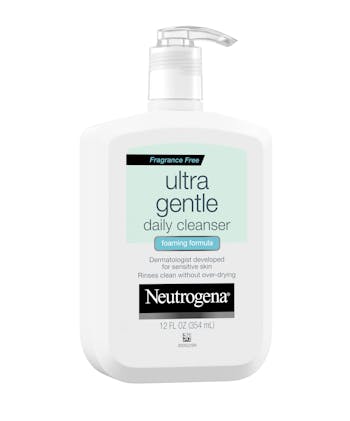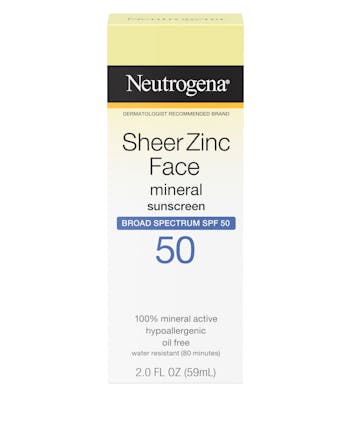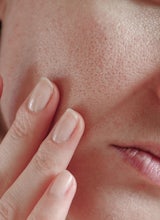If your skin tends to respond to skincare products, cosmetics and environmental stressors with dryness, redness, flakiness and inflammation, then you're well acquainted with the ups and downs of sensitive skin. A little dramatic, right?
However, you can take steps to keep even the most reactive and easily triggered skin happy — beginning with understanding how to choose the best facial cleanser for sensitive skin.
Ready for a clean start?
How Do You Know if You Have Sensitive Skin?
First things first: What is sensitive skin? Sensitive skin is a skin type characterized by inflammation and irritation due to external factors (e.g., allergens and weather changes) and internal factors (e.g., hormonal shifts). Essentially, sensitive skin is your body's response to seemingly minor triggers that other skin types might easily ignore.
To determine whether you have sensitive skin, look for these telltale signs.
Redness and Rashes
Redness and rashes are more than just a temporary flush; they're sensitive skin's SOS signals in response to irritants.
Irritation
Does your skin often burn, sting or itch in certain situations, such as when you wear new clothes or experience a temperature change? While occasional irritation doesn't spell sensitivity, regular and unexplained flare-ups are a hallmark of sensitive skin.
Dryness
Sensitive skin often struggles to maintain moisture, leading to a dry, tight sensation and sometimes even cracking or flaking. In true Catch-22 fashion, this dryness can increase itching and peeling, making skin even more sensitive.
Reactivity
Sensitive skin is notorious for its quick negative response to new personal care products, from makeup to soap.
What Is Liquid Face Cleanser?
You've probably seen liquid cleansers lining the skincare aisles — bottles of colorful fluid that promise to soothe, brighten, deep clean and hydrate. But how do they differ from traditional bar soap beyond the obvious?
The key lies in their formulation. Liquid cleansers aren't limited to ingredients that stay solid at room temperature or that need to break down in contact with water. This gives liquid cleansers greater flexibility so they have more opportunities to meet your skin's needs. Cosmetic scientists can pack them with humectants, emollients and other skin-friendly ingredients without the same restraints.
Is Liquid Cleanser Good for Sensitive Skin?
The short answer is yes. Most traditional bar soaps have an alkaline pH in the range of 9 to 10. This can strip away your skin's natural oils and moisture, disrupting its natural barrier and making it even more sensitive.
Liquid cleansers have a pH of 5 to 6, which is more similar to your skin's natural pH level. Preserving the skin's pH level is crucial to maintaining a strong, healthy skin barrier. Products with a high pH can make your skin too alkaline, leaving it prone to acne, redness and sensitivity.
Liquid cleansers can also be infused with ingredients like glycerin, ceramides and probiotics — all of which restore, rather than deplete, natural oils to fortify the skin barrier, soothe dryness, calm inflammation and minimize redness and itching.
How To Use a Liquid Face Cleanser To Wash Sensitive Skin
The best facial cleanser for sensitive skin is free of alcohol, fragrance, dyes, sulfates and alpha-hydroxy acids, which can promote further irritation. Also, look for moisture-replenishing humectants, skin-smoothing emollients and microbiome-protecting probiotics.
Try a gentle cleanser like Neutrogena® Ultra Gentle Daily Cleanser for Sensitive Skin. This formula is non-comedogenic, fragrance-free and soap-free, and clinically proven to be gentle on all skin types. Plus, it's packed with skin-soothing, moisture-binding glycerin to gently cleanse while preserving the skin barrier.
Looking for more options? Neutrogena® Hydro Boost Hydrating Gel Cleanser gently cleanses, hydrates and improves skin's appearance (clarity, texture and radiance). Formulated with dermatologist-recommended hyaluronic acid, this fragrance-free formula clinically boosts skin's hydration while rinsing away dirt, oil and makeup.
Now that you have your cleanser sorted, follow these simple steps to make sure it cleanses your skin effectively without irritation.
Turn Down the Temperature
This step is essential to prevent further aggravating sensitive skin. Hot water can over-dilate blood vessels, breaking delicate skin tissue and making it even more sensitive. Opt for lukewarm water, which is less likely to do any damage.
Apply Cleanser Gently
Work in your cleanser in gentle, circular motions. You can get all the benefits of liquid cleansing in 20 to 30 seconds of washing, so avoid overwashing or scrubbing. This minimizes irritation, avoiding redness and maintaining the skin's integrity.
Pat Dry
To wrap up your wash, gently pat your skin dry with a soft, clean cloth. Avoid rubbing. Gentle patting helps preserve the skin's natural balance and barrier. This method is less abrasive and helps prevent irritation and damage to the skin's surface.
Post-Cleansing Care for Sensitive Skin
Once you dry your face, you're not done quite yet. Follow these steps to effectively help calm and nourish your sensitive skin after cleansing.
Hydrate Immediately
Apply a moisturizer while your skin is still slightly damp. This helps lock in moisture and maintain the skin's hydration levels. Look for moisturizers with ingredients like hyaluronic acid, glycerin, ceramides and aloe vera, which are known for their soothing and hydrating properties. Neutrogena® Hydro Boost Gel Cream and Neutrogena® Daily Facial Moisturizer both fit the bill!
Apply a Skin Barrier Repair Product
Consider using products designed to repair and strengthen the skin barrier.
Use Sun Protection
Sunscreen is necessary for all skin types, but this may be especially true for sensitive skin, which can be more prone to sun damage. Use a broad-spectrum sunscreen with an SPF of at least 30. Sensitive skin usually best tolerates mineral sunscreens containing zinc oxide or titanium dioxide, so choose a formula like Neutrogena® Sheer Zinc Face Mineral Sunscreen Broad Spectrum SPF 50. Awarded the National Eczema Association Seal of Acceptance™ as suitable for use on people with sensitive skin conditions, this sunscreen is made with 100% mineral actives and boasts a non-greasy, lightweight finish.
Indulge in Nighttime Care
Consider using a restorative night cream or oil to help support skin's natural renewal process while sleeping. Look for products with calming and repairing ingredients like lavender, squalane or marula oil.
Your Sensitive Skin Success Story
Remember: Managing sensitive skin doesn't need to be a daunting task. Start by making small tweaks to your regular skincare routine to banish harsh and irritating ingredients and highlight hydrating, soothing formulas. Embrace these easy steps and watch your sensitive skin thrive, radiating health and happiness!












